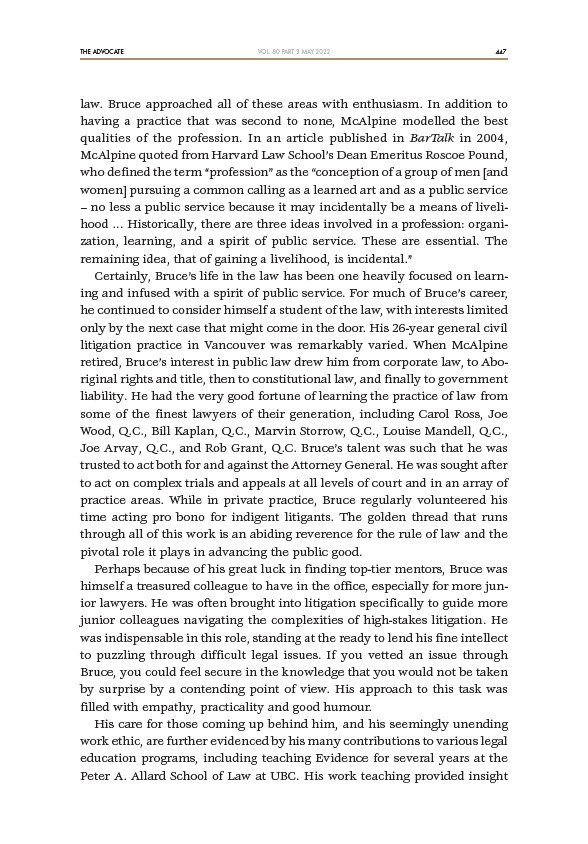
THE ADVOCATE 447
VOL. 80 PART 3 MAY 2022
law. Bruce approached all of these areas with enthusiasm. In addition to
having a practice that was second to none, McAlpine modelled the best
qualities of the profession. In an article published in BarTalk in 2004,
McAlpine quoted from Harvard Law School’s Dean Emeritus Roscoe Pound,
who defined the term “profession” as the “conception of a group of men and
women pursuing a common calling as a learned art and as a public service
– no less a public service because it may incidentally be a means of livelihood
… Historically, there are three ideas involved in a profession: organization,
learning, and a spirit of public service. These are essential. The
remaining idea, that of gaining a livelihood, is incidental.”
Certainly, Bruce’s life in the law has been one heavily focused on learning
and infused with a spirit of public service. For much of Bruce’s career,
he continued to consider himself a student of the law, with interests limited
only by the next case that might come in the door. His 26-year general civil
litigation practice in Vancouver was remarkably varied. When McAlpine
retired, Bruce’s interest in public law drew him from corporate law, to Aboriginal
rights and title, then to constitutional law, and finally to government
liability. He had the very good fortune of learning the practice of law from
some of the finest lawyers of their generation, including Carol Ross, Joe
Wood, Q.C., Bill Kaplan, Q.C., Marvin Storrow, Q.C., Louise Mandell, Q.C.,
Joe Arvay, Q.C., and Rob Grant, Q.C. Bruce’s talent was such that he was
trusted to act both for and against the Attorney General. He was sought after
to act on complex trials and appeals at all levels of court and in an array of
practice areas. While in private practice, Bruce regularly volunteered his
time acting pro bono for indigent litigants. The golden thread that runs
through all of this work is an abiding reverence for the rule of law and the
pivotal role it plays in advancing the public good.
Perhaps because of his great luck in finding top-tier mentors, Bruce was
himself a treasured colleague to have in the office, especially for more junior
lawyers. He was often brought into litigation specifically to guide more
junior colleagues navigating the complexities of high-stakes litigation. He
was indispensable in this role, standing at the ready to lend his fine intellect
to puzzling through difficult legal issues. If you vetted an issue through
Bruce, you could feel secure in the knowledge that you would not be taken
by surprise by a contending point of view. His approach to this task was
filled with empathy, practicality and good humour.
His care for those coming up behind him, and his seemingly unending
work ethic, are further evidenced by his many contributions to various legal
education programs, including teaching Evidence for several years at the
Peter A. Allard School of Law at UBC. His work teaching provided insight